|
 Secure Site
Secure Site
|
 |
Archive for the 'Japanese Inspired Zen Clocks' Category
 Harunobu Suzuki, A girl Collecting Chrysanthemums by a Stream The courage to witness
Ancient contemplative practices have long understood the nature of mind as something that pushes away pain and clings to pleasure. But if you’re like most people, you probably didn’t begin yoga or meditation intent on acquiring tools to help relieve your suffering. Instead you’ve been waiting for the moment when you could balance on your head or sit without fidgeting on your meditation cushion. Then one day in a yoga class, you realize that you don’t hear your usual internal dialogue bemoaning your inherently stiff hamstrings or comparing your abilities to everyone else’s. Instead, you are aware of your breathing, and you begin to notice the subtle feelings within your body as you practice. You’ve been tuning into what’s happening as it is, in fact, happening. You have been practicing mindfulness.
Stay Present
These three simple tips can be practiced under everyday circumstances so that when you find yourself faced with intense situations, like grief, the skills may have already taken root.
 Yoga
Smoothing the breath
The breath and the mind travel in tandem. When the breath gets agitated, the mind cannot settle. By bringing attention into the breath, the mind is naturally soothed. For five minutes a day, sit quietly and simply pay attention to the path of the breath in and out of the nose as you soften the tongue and release the jaw. Allow thoughts to come and go, but continuously bring your focus back to the breath.
Dropping in
The body reflects our physical, emotional, and mental states. For instance, joy spontaneously lightens the step and softens the face, whereas depression can cause the shoulders and chest to collapse down. At random moments when you think of it through the course of each day, just check in with your physical state. Make note of your physical feelings and sensations and the quality of your breath. Then consider what thought or circumstance might be contributing to that experience.
Being kind
When others offer you kindness, responding congenially comes easily. But when others act unhappy, angry, or distant, being kind proves more difficult. The easy path? Responding with an equally charged emotion, or simply leaving the person alone to suffer. When unpleasant situations with others arise, experiment with making no assumptions about why they behave as they do. Simply offer kind support—without the desire that your act of compassion will change the situation or benefit you.
Although meditation can be done in almost any context, practitioners usually employ a quiet, tranquil space, a meditation cushion or bench, and some kind of timing device to time the meditation session. Ideally, the more these accoutrements can be integrated the better. Thus, it is conducive to a satisfying meditation practice to have a timer or clock that is tranquil and beautiful. Using a kitchen timer or beeper watch is less than ideal. And it was with these considerations in mind that we designed our digital Zen Alarm Clock and practice timer. This unique “Zen Clock” features a long-resonating acoustic chime that brings the meditation session to a gradual close, preserving the environment of stillness while also acting as an effective time signal.
Excerpted from Natural Solutions, January 2007 by Mary Taylor
 Bamboo Zen Clocks, progressive chime clock and timer
Now & Zen’s Meditation Timer Store
1638 Pearl Street
Boulder, CO 80302
(800) 779-6383
Posted in Chime Alarm Clocks, intention, Japanese Inspired Zen Clocks, Meditation Timers, Meditation Tools, mindfulness practice, Now & Zen Alarm Clocks, Well-being
 Shinsui Itō, Before a Mirror (1916) Ukiyo-e People in need of a creative boost should take a long nap, according to new research highlighted by ScienCentral. The researchers found that naps increase people’s ability to solve problems creatively, but only if the nap includes REM, the deep sleep when dreams occur. REM sleep happens only after about an hour of sleeping, so a long nap is recommended. According to researcher Sara Mednick, “if you take a nap with REM sleep, you’re actually going to be boosting your ability to make these new associations in creative ways.” Mednick has tried to put her findings to good use by taking a nap at least three times each week. A good way to peacefully end your nap is to use your Zen Alarm Clock with progressive chimes.
adapted from Utne.com by Bennett Gordon, September 2009
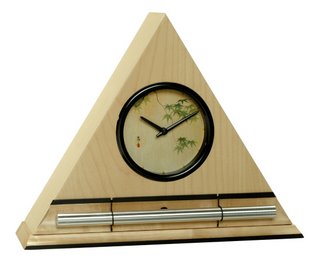 Zen Alarm Clock in Maple Finish with Maple Leaves Dial Face and Chime Now & Zen – The Zen Alarm Clock Store
 Set Your Gentle, Chime Alarm Clock -- The Zen Alarm Clock Shop 1638 Pearl Street
Boulder, CO 80302
(800) 779-6383
Posted in Bamboo Chime Clocks, Chime Alarm Clocks, Japanese Inspired Zen Clocks, mindfulness practice, Natural Awakening, Now & Zen Alarm Clocks, Progressive Awakening, Sleep Habits, Ukiyo-e, Well-being
 Eisen Keisai, Woman Getting out of a Mosquito Net It has happened to all of us: You sit up in bed after a doozy of a dream and wonder What did that mean? Mankind’s fascination with dreams has a long history. In fact, one of the world’s oldest surviving documents, an Egyptian papyrus, contains dream interpretations. Most ancient cultures believed dreams were communications from deities or departed souls. More recently, psychologists Sigmund Freud and Carl Jung paved the way for using dream analysis when treating patients, believing dreams could shed light on the workings of the unconscious mind. Today, many medical and psychiatric professionals believe dreaming can help us move beyond depression and grief and even identify underlying health issues.
As long as you are sleeping, you are dreaming. That’s right, everyone dreams—even if you don’t remember your nightly adventures. “Most dreams occur during REM (rapid eye movement) sleep, which replenishes certain neurotransmitters,” writes Deirdre Barrett, PhD, assistant professor of psychology at Harvard Medical School, in her book The Committee of Sleep (Crown, 2001). Since you enter the light sleep stage characterized by REM every 90 minutes, you’ll likely have four to five dreams a night, assuming you sleep for eight hours. “Interfering with REM, and thus dreaming, interferes with creativity, problem-solving capability, memory, and, in extreme situations, even immune function and body temperature,” says Barrett. You don’t have to remember your dreams to reap some of the benefits, but if you can recall them, your dreams could tell you a lot. “But stay away from dream dictionaries that would have you believe that one symbol means one thing,” Barrett warns. Instead, she recommends Our Dreaming Mind by Robert L. Van de Castle (Ballantine Books, 1995), which focuses on dream theory and learning to work with your dreams. If you really dive deeply into your dream life, the payoff is multifold. You can tap into more clarity and creativity, feel less depressed and stressed, and maybe even be able to predict disease.
Boulder, Colorado—an innovative company has taken one of life’s most unpleasant experiences (being startled awake by your alarm clock early Monday morning), and transformed it into something to actually look forward to. “The Zen Alarm Clock,” uses soothing acoustic chimes that awaken users gently and gradually, making waking up a real pleasure. Rather than an artificial recorded sound played through a speaker, the Zen Clock features an alloy chime bar similar to a wind chime. When the clock’s alarm is triggered, its chime produces a long-resonating, beautiful acoustic tone reminiscent of a temple gong. Then, as the ring tone gradually fades away, the clock remains silent until it automatically strikes again three minutes later. The frequency of the chime strikes gradually increase over ten-minutes, eventually striking every five seconds, so they are guaranteed to wake up even the heaviest sleeper. This gentle, ten-minute “progressive awakening” leaves users feeling less groggy, and even helps with dream recall.
adapted from Natural Solutions Magazine, August 2009
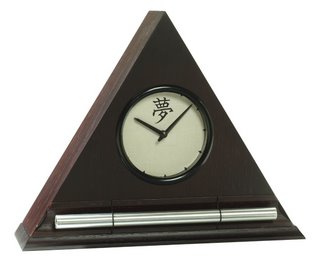 Dream Kanji Zen Alarm Clock with chime in Dark Oak Finish, a wellness tool for remembering dreams Now & Zen’s Chime Alarm Clock Store
1638 Pearl Street
Boulder, CO 80302
(800) 779-6383
Posted in Chime Alarm Clocks, Japanese Inspired Zen Clocks, mindfulness practice, Natural Awakening, Now & Zen Alarm Clocks, Progressive Awakening, Well-being
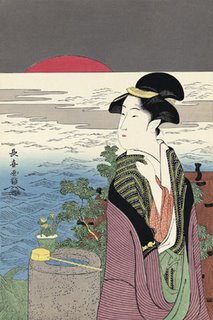 Choki Eishosai, Sunrise at New Year It’s hard to learn from your dreams if you can’t remember them. But even if you draw a blank every morning, don’t fret. Follow these steps, recommended by Deirdre Barrett, PhD, assistant professor of psychology at Harvard Medical School, and Andrew Holecek, a dream workshop teacher at Colorado’s Shambhala Mountain Center, to enhance your dream recall.
- Get seven to eight hours of sleep a night. The more you sleep, the more dreams you will have, increasing the likelihood you’ll remember one of them.
- Throughout the day and right before you fall asleep, remind yourself of your intention to remember your dreams.
- Keep a pen and paper by your bed. A dream journal can encourage recall and, at the very least, help you document any fragment you do remember upon waking.
- When you first wake up, don’t move. Lie quietly and reflect on any image that comes to mind. Sometimes a whole dream scenario will come back to you.
- Be mindful during the day, not just about dreams but about everything going on around you. The lucidity you cultivate in waking life will translate to your dream life.
- Set the Zen Alarm Clock to wake you every two hours throughout the night. When the chimming alarm sounds, write down as much as you can remember about the dream you were just having.
Boulder, Colorado—an innovative company has taken one of life’s most unpleasant experiences (being startled awake by your alarm clock early Monday morning), and transformed it into something to actually look forward to. “The Zen Alarm Clock,” uses soothing acoustic chimes that awaken users gently and gradually, making waking up a real pleasure. Rather than an artificial recorded sound played through a speaker, the Zen Clock features an alloy chime bar similar to a wind chime. When the clock’s alarm is triggered, its chime produces a long-resonating, beautiful acoustic tone reminiscent of a temple gong. Then, as the ring tone gradually fades away, the clock remains silent until it automatically strikes again three minutes later. The frequency of the chime strikes gradually increase over ten-minutes, eventually striking every five seconds, so they are guaranteed to wake up even the heaviest sleeper. This gentle, ten-minute “progressive awakening” leaves users feeling less groggy, and even helps with dream recall.
Now & Zen’s Chime Alarm Clock Store
1638 Pearl Street
Boulder, CO 80302
(800) 779-6383
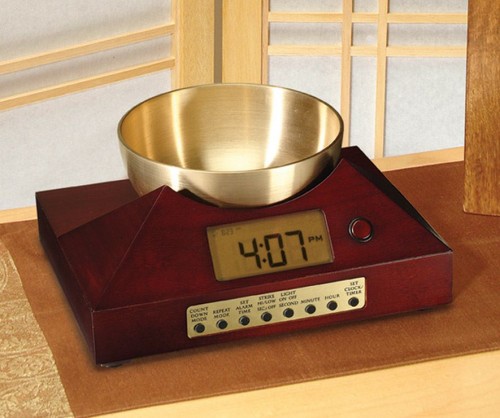 Zen Timepiece, an alarm clock to wake you from napping with Tibetan bowl/gong
Posted in Bamboo Chime Clocks, Chime Alarm Clocks, Japanese Inspired Zen Clocks, mindfulness practice, Natural Awakening, Now & Zen Alarm Clocks, Progressive Awakening, Sleep Habits, Ukiyo-e, Well-being, Zen Clocks and Dream Recall
 koi
“I wish I could show you
When you are lonely
Or in darkness,
The astonishing light
Of your own being.”
-Hafiz
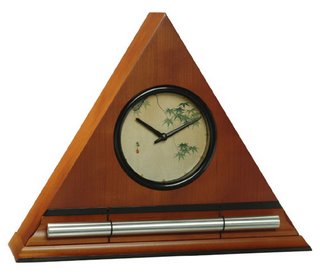 Honey Japanese Maple Leaves Zen Alarm Clock, calming alarm clock
Now & Zen – The Zen Alarm Clock Shop
1638 Pearl Street
Boulder, CO 80302
Posted in Bamboo Chime Clocks, Chime Alarm Clocks, Japanese Inspired Zen Clocks, Meditation Timers, Meditation Tools, Natural Awakening, Now & Zen Alarm Clocks, Truth
 Pierre-Cécile Puvis de Chavannes: The Dream, 1883
Sleep Type: The Human Alarm Clock
You crash as soon as your head hits the pillow, but wake like clockwork at 2, 3, or 4 a.m.
What’s Going On?
“We all wake up briefly — two to three dozen times a night — without awareness or memory,” says Paul Glovinsky, Ph.D., coauthor of “The Insomnia Answer.” If you’re all too aware of your awakenings, a number of things may be going on. Simple conditioning, a la Pavlov’s dogs, could be to blame. Your body can be “on the lookout for that awakening, especially if there’s a clock in the bedroom,” Glovinksy says. Also consider stress: You may fall asleep out of pure exhaustion, but as soon as your sleep needs are slightly quenched, anxieties wake you up again. For some people, says Rubin Naiman, Ph.D., director of Sleep Programs at Miraval Resort, the body’s inner clock, or circadian rhythms, may be malfunctioning
What to Do
Whatever’s behind your awakenings, hiding your neon time reminder is step one. This would be the perfect time to get the Zen Alarm Clock in the Digital style (so you could close the lid) or the original style without the light. If you can’t see the clock, you won’t panic as you calculate how many hours remain until daybreak — and how little you’ve slept. “Put it on the floor or close the cover to the Zen Clock,” says Joyce Walsleben, R.N., Ph.D., associate professor of medicine at New York University. “When the alarm chimes, you can get up, but otherwise, you’re in bed to sleep.” For many people, this simple shift alone reconditions their brain.
Boulder, Colorado—an innovative company has taken one of life’s most unpleasant experiences (being startled awake by your alarm clock early Monday morning), and transformed it into something to actually look forward to. “The Zen Alarm Clock,” uses soothing acoustic chimes that awaken users gently and gradually, making waking up a real pleasure.
What makes this gentle awakening experience so exquisite is the sound of the natural acoustic chime, which has been tuned to produce the same tones as the tuning forks used by musical therapists. According to the product’s inventor, Steve McIntosh, “once you experience this way of being gradually awakened with beautiful acoustic tones, no other alarm clock will ever do.”
adapted from Body + Soul, May 2008 by Sarah Schmelling
 Alarm Clocks for a Progressive Awakening, Zen Clocks in Digital Styles Now & Zen – The Most Gentle Alarm Clocks with Chimes
Visit Our Shop
1638 Pearl Street
Boulder, CO 80302
Posted in Bamboo Chime Clocks, Goodness, Japanese Inspired Zen Clocks, Meditation Timers, Meditation Tools, mindfulness practice, Natural Awakening, Progressive Awakening, Sleep Habits, Well-being, Zen Clocks and Dream Recall
 Koitsu, Full Moon at Akashi Beach Warm milk, chamomile tea, curling up with The Poetry of Zen—all useful strategies in the battle to beat insomnia. You might want to add auricular, or ear, acupuncture to the arsenal. A review of six trials in The Journal of Alternative and Complementary Medicine found that stimulating certain acupuncture points around the ear could put your insomnia to sleep. Six points were deemed the most effective: shenmen, heart, occiput, subcortex, brain, and kidney.
Hong Kong Baptist University researchers noted acupuncture’s rate of success was high both when compared to a placebo and to sleep medications and anti-anxiety drugs. How auricular acupuncture works is still being explored, but initial studies indicate it increases melatonin, the sleepy-time hormone.
Our Zen Alarm Clock’s long-resonating Tibetan bell-like chime makes waking up a beautiful experience – its progressive chimes begin your day with grace. When the clock’s alarm is triggered, the acoustic chime bar is struck just once … 3-1/2 minutes later it strikes again … chime strikes become more frequent over 10 minutes … eventually striking every 5 seconds until shut off. As they become more frequent, the gentle chimes will always wake you up – your body really doesn’t need to be awakened harshly, with a Zen Clock you’re awakened more gradually and thus more naturally. Unlike artificial recorded sounds coming out of a tiny speaker in a plastic box, natural acoustic sounds transform your bedroom or office environment.
adapted from Natural Solutions,January 2008 By Matthew Solan
 Dream Kanji Zen Alarm Clock with chime in Dark Oak Finish, a wellness tool for insomnia
Now & Zen’s Chime Alarm Clock Store
1638 Pearl Street
Boulder, CO 80302
(800) 779-6383
Posted in Chime Alarm Clocks, Japanese Inspired Zen Clocks, Natural Awakening, Now & Zen Alarm Clocks, Progressive Awakening, Sleep Habits, Ukiyo-e
 Isoda Koryusai, Japanese (active c. 1764–1788), Courtesan Playing the Samisen Home is a container of soul health. The roof and walls shelter and nurture the spark of life that animates our modes of dwelling. They define the setting where soul health is transformed from raw energy into the myriad experiences of living. Furniture, clothing, and other objects foster the inner work of the psyche. The bed encourages the soul to dream and make love. Each element of home plays its role in bringing forth the latent possibilities of soul.
The headlines of spiritual experience are often grabbed by dramatic tales of angelic light and celestial encounters, but soulfulness mainly grows within the realms of everyday life. A cozy moment in bed that warms a deep place within us, a conversation at the kitchen table that connects parent and child, and other common experiences sustain and enrich the depths of who we are.
The needs of soul health are satisfied through the archetypal actions of human dwelling —cooking, eating, gathering with others, sleeping, dreaming, lovemaking, bathing, managing finances, and solitude. Cooking, for example, is a practical activity that creates edible meals; it also cares for the souls health creative urge to transform the raw stuff of life into digestible and appetizing forms. Eating satisfies the hunger in our bellies, but also satisfies the soul’s desire for fulfillment.
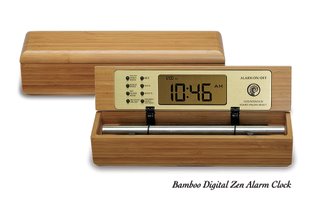 Bamboo Digital Chime Clock, a calming timer and alarm clock made from natural materials like bamboo, walnut, and maple The rooms and furniture of your home are more than a mere collection of isolated objects. They are tangible nurturers of soul health. A home for the soul sparks our imagination. Its architecture and furnishings offer more than mechanical functions and urge us to explore the essence of who we truly are. Colors, textures, and shapes act as bridges that lead our attention from the material world of isolated objects into the interconnected realm of he spirit.
A home for the soul offers more than one level of experience at a time. It simultaneously addresses all levels of mind, body, and environment—our myths, emotions, thoughts, senses, actions, bodily functions, and the ecological processes of nature. The bathtub of such a home might honor Venus’s desire for beauty, ease the conflict of a hectic day, warm and soothe the body, cleanse the skin’s pores, and connect us to the sprinkling of rain and the flowing of streams.
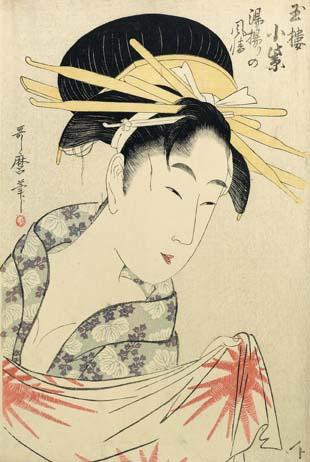 Kitagawa Utamaro, Komuraski of the Tamaya, House After a Bath, 1795 A home for the soul is not a material goal to be acquired, but a setting for inquiring into the processes of living. Within its walls we can discover how the germ of consciousness within us grows to become the events and circumstances that define our existence. We can discern the links between our personal needs and dreams and the universal forces that shape the cosmos. In a home for the soul health, common objects and actions become symbols that at once hide and reveal the deeper powers that animate our lives.
A home for the soul has character and personality. It contains rich textures and colors that invite the hand and delight the eye. It reflects subtle gradations of light that range from murky shadows to shimmering points of illumination. Forms are imaginative and reveal how they support activity. There is care and attention to detail. Natural materials such as wood, stone, wool, silk, and cotton are used to create an environment that opens to the vitality of sunlight and fresh air. A home for the souls health is a sensuous dwelling place that urges us to savor the mingling of spirit and matter.
Boulder, Colorado—an innovative company has taken one of life’s most unpleasant experiences (being startled awake by your alarm clock early Monday morning), and transformed it into something to actually look forward to. “The Zen Alarm Clock,” uses soothing acoustic chimes that awaken users gently and gradually, making waking up a real pleasure. Rather than an artificial recorded sound played through a speaker, the Zen Clock features an alloy chime bar similar to a wind chime. When the clock’s alarm is triggered, its chime produces a long-resonating, beautiful acoustic tone reminiscent of a temple gong. Then, as the ring tone gradually fades away, the clock remains silent until it automatically strikes again three minutes later. The frequency of the chime strikes gradually increase over ten-minutes, eventually striking every five seconds, so they are guaranteed to wake up even the heaviest sleeper. This gentle, ten-minute “progressive awakening” leaves users feeling less groggy, and even helps with dream recall.
 Zen Chime Clock with Japanese Maple Leaves in Honey Finish, an alarm clock for your body, mind and spirit Now & Zen – The Gentle, Soothing Alarm Clock Store
1638 Pearl Street
Boulder, CO 80302
adapted from Natural Home, July/August 1999
Reprinted from Home for the Soul by Anthony Lawlor. Copyright © 1997, Anthony Lawlor. Reprinted with permission of Clarkson N. Potter, a division of Crown Publishers.
Posted in Chime Alarm Clocks, Japanese Inspired Zen Clocks, mindfulness practice, Natural Awakening, Progressive Awakening, Sleep Habits
 yoga practice in bamboo As Robert Svoboda attempts to summarize the three major paths of the Vedic knowledge, he writes:
Because every embodied individual is composed of a body, a mind and a spirit, the ancient Rishis of India who developed the Science of Life organized their wisdom into three bodies of knowledge: Ayurveda, which deals mainly with the physical body; Yoga, which deals mainly with spirit; and Tantra, which is mainly concerned with the mind.
The philosophy of all three is identical; their manifestations differ because of their differing emphases. Ayurveda is most concerned woth the physical basis of life, concentrating on its harmony of mind and spirit. Yoga controls body and mind to enable them to harmonize with spirit, and Tantra seeks to use the mind to balance the demands of body and spirit.
Use our unique “Zen Clock” which functions as a Yoga Timer. It features a long-resonating acoustic chime that brings your meditation or yoga session to a gradual close, preserving the environment of stillness while also acting as an effective time signal. Our Yoga Timer & Clock can be programmed to chime at the end of the meditation or yoga session or periodically throughout the session as a kind of sonic yantra. The beauty and functionality of the Zen Clock/Timer makes it a meditation tool that can actually help you “make time” for meditation in your life. Bring yourself back to balance.
adapted from wikipedia.org
 Meditation & Yoga Timers and Clocks
Now & Zen’s Yoga Timer Store
1638 Pearl Street
Boulder, CO 80302
Posted in Chime Alarm Clocks, Japanese Inspired Zen Clocks, Meditation Timers, Meditation Tools, mindfulness practice, Progressive Awakening, Well-being, Yoga Timer, Yoga Timers by Now & Zen, Zen Timepiece by Now & Zen, Zen Timers
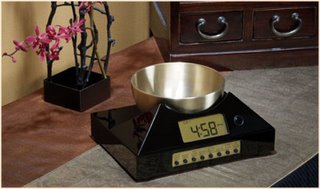 Zen Timepiece, tibetan singing bowl timer and clock Singing bowls (also known as Himalayan bowls, rin gongs, medicine bowls, Tibetan bowls or suzu gongs in Japan) are a type of bell, specifically classified as a standing bell. Rather than hanging inverted or attached to a handle, standing bells sit with the bottom surface resting. The sides and rim of singing bowls vibrate to produce sound.
Singing bowls were traditionally used throughout Asia as part of Bon and Tantric Buddhist Sadhana. Today they are employed worldwide both within and without these spiritual traditions, for meditation, trance-induction, relaxation, healthcare, personal well-being and religious practice.
Singing bowls were historically made in Tibet, India, Nepal, Bhutan, China, Japan, and Korea. Today they are made in Nepal, India, Japan and Korea. The best known type are from the Himalayan region and are often termed Tibetan singing bowls.
Our Zen Timepiece’s acoustic 6-inch brass bowl-gong clock is the world’s ultimate alarm clock, practice timer, and “mindfulness bell.”
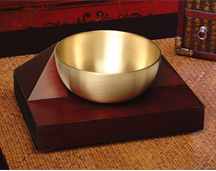 Singing Bowl Alarm Clocks - Never Hit Your Snooze Button Again It fills your environment with beautifully complex tones whenever it strikes. In the morning, its exquisite sounds summon your consciousness into awakening with a series of subtle gongs that provide an elegant beginning to your day. Once you experience the Zen Timepiece’s progressive awakening, you’ll never want to wake up any other way. It also serves as the perfect meditation timer. Available in 5 wood styles, including bamboo.
adapted from wikipedia.org
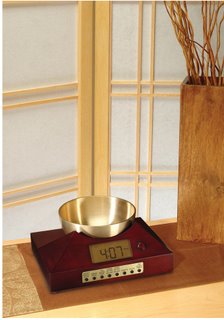 Zen Timepiece, a bowl/gong alarm clock and timer in cherry finish Now & Zen’s Singing Bowl Clock Store
1638 Pearl Street
Boulder, CO 80302
(800) 779-6383
Posted in Chime Alarm Clocks, Japanese Inspired Zen Clocks, Well-being, Yoga Timer, Yoga Timers by Now & Zen, Zen Clocks and Dream Recall, Zen Timepiece by Now & Zen, Zen Timers
« Previous Page — « Previous Entries
Next Entries » — Next Page »
|
|
|
|